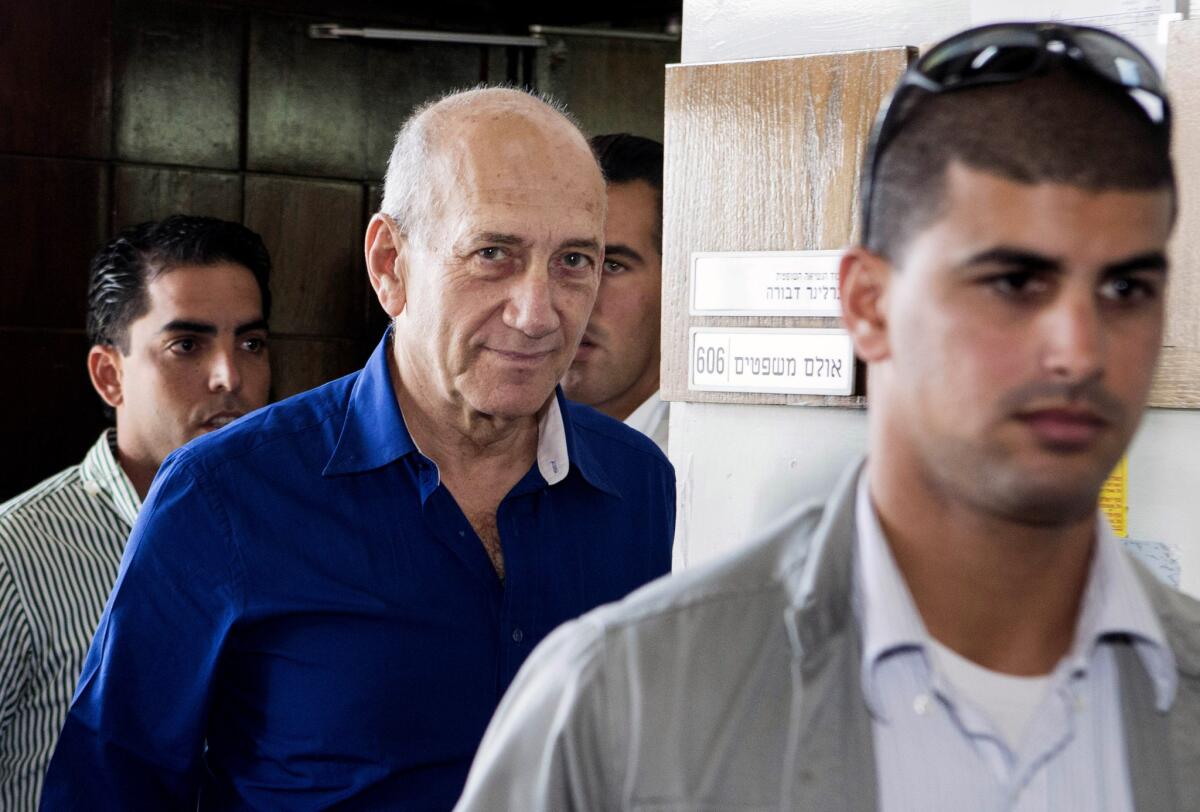Ex-Israeli leader Ehud Olmert sentenced to 6 years for bribe-taking

- Share via
Reporting from Jerusalem — One of Israel’s highest-profile court cases ended Tuesday with a scathing critique of public corruption, harsh jail sentences and a former prime minister sent to prison, effectively ending Ehud Olmert’s decades-long political career.
Olmert was found guilty in late March of two counts of accepting bribes as part of a massive real estate scam known as the “Holyland affair.”
The scandal took its name from a Jerusalem housing development, a linked chain of highrise apartment towers that initially stirred controversy on esthetic and environmental grounds. Prosecutors later charged that the approval and building process had been marred by widespread irregularities and corruption.
The project began during Olmert’s tenure as mayor of Jerusalem in the 1990s. He was elected prime minister in 2006 and announced his resignation in 2008 amid separate corruption allegations, but remained in office until elections were held in 2009. He ultimately was tried and acquitted on those charges, which included allegations that he accepted thousands of dollars in cash-stuffed envelopes from an American businessman.
On Tuesday, Olmert, 68, was sentenced to six years in prison and ordered to pay a $290,000 fine. Six others, among them Jerusalem’s former city engineer, a sitting city councilman and a business entrepreneur, were sentenced to jail terms of between three and eight years and ordered to pay hefty fines.
Several others convicted of taking or offering bribes, including Uri Lupoliansky, who succeeded Olmert as mayor, are to be sentenced in coming days.
Judge David Rozen’s harsh sentences were accompanied with equally harsh words: “A public official accepting bribes is akin to a traitor,” he wrote.
Prosecutor Liat Ben-Ari expressed hope that the case would become “a significant milestone in our ongoing battle against public corruption.”
Speaking to throngs of reporters crowding the Tel Aviv courthouse, Ben-Ari said that “no one is above the law” and that any who takes or gives bribes must face the same justice.
Olmert did not comment immediately after the sentencing. He maintained his innocence after the conviction six weeks ago.
His spokesman, Amir Dan, said the sentence is based on “a mistaken verdict, a tower of cards built on speculation and assumption.” He criticized the court for “harshly punishing a man who never took bribes and who contributed a great deal to the country,” and said Olmert would appeal the verdict and the prison sentence.
Eli Zohar, one of several attorneys defending the former prime minister, called the sentence “unprecedented and disproportionate,” and expressed hope that an appeal would overturn the conviction and sentence. Some legal commentators have said Olmert may have a strong appellate case.
On a personal level, Zohar said, “my heart goes out to him, his family and the nation.”
Israel is not considered especially corrupt by international standards. The latest ranking by Transparency International places it 36th among 175 countries in terms of perceptions of public corruption. However, a striking number of politicians have been charged with corruption in recent years—as well as a former president imprisoned for rape—raising alarm among many Israelis.
Eliad Shraga, an attorney and longtime crusader against corruption, called corruption “a strategic existential threat to Israel,” and told Israeli television that the Holyland case marks a turning point in the fight against it.
“It is not a simple day when a former prime minister is sentenced,” Justice Minister Tzipi Livni said. She expressed her confidence in Israel’s courts and law enforcement and said “this is how the public should feel too.”
Olmert and the others are scheduled to report to jail on Sept. 1.
Sobelman is a special correspondent.
More to Read
Sign up for Essential California
The most important California stories and recommendations in your inbox every morning.
You may occasionally receive promotional content from the Los Angeles Times.










